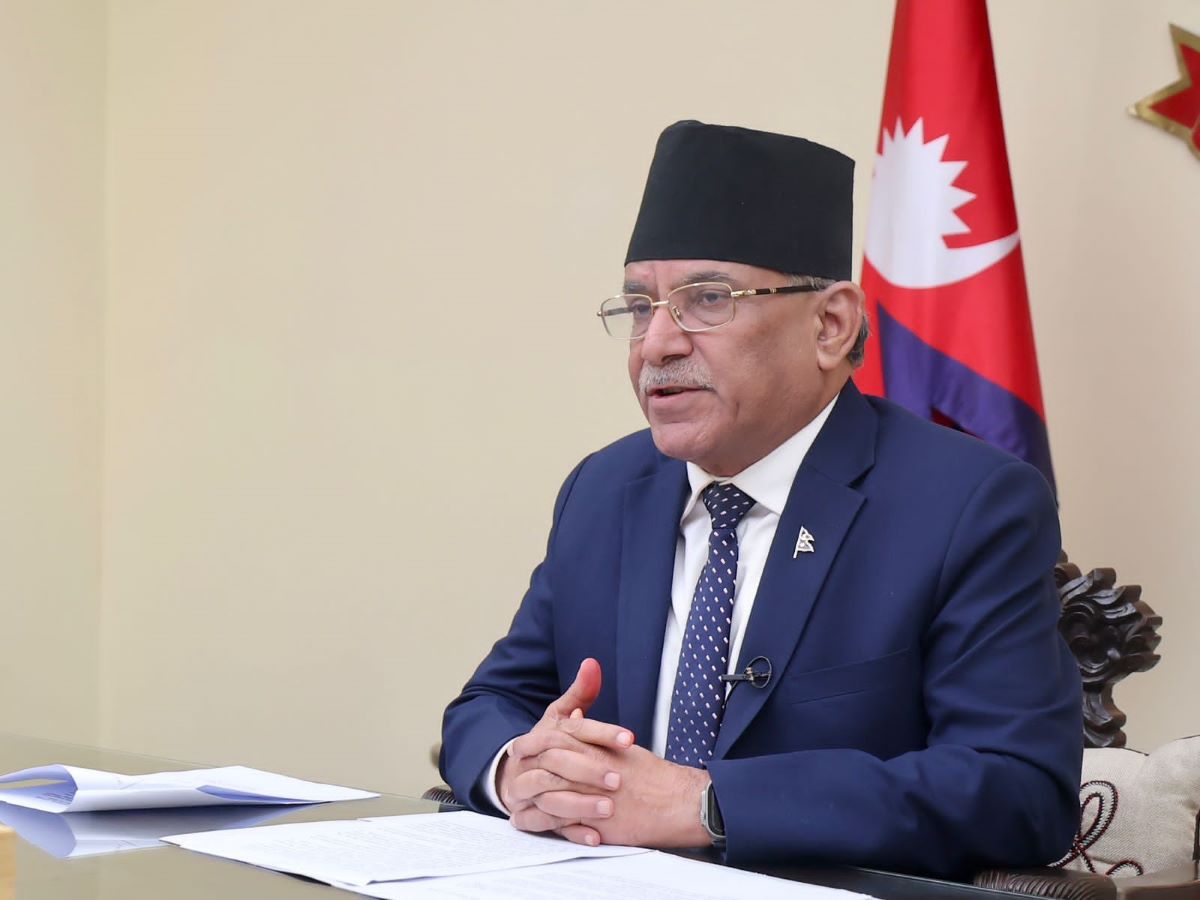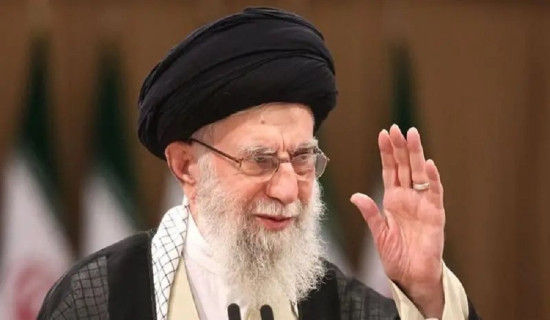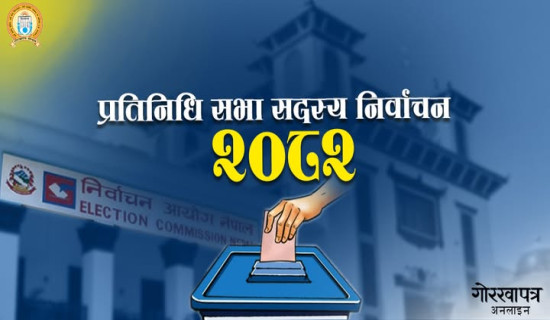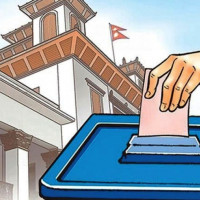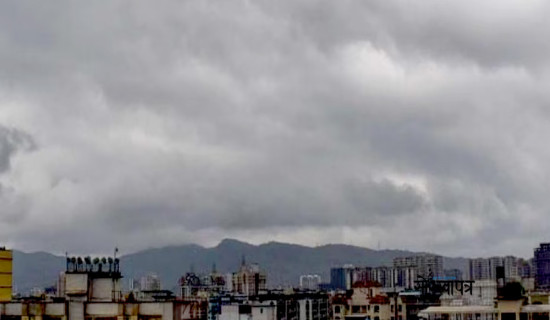- Sunday, 1 March 2026
Effect of climate change on Himalayas has posed severe threat: PM Prachanda
By TRN Online, Kathmandu, Nov. 17: Prime Minister Pushpa
Kamal Dahal ‘Prachanda’ has said that the effect of climate change on the
Himalayas has posed severe threat to the lives and livelihoods of millions of
people living in the south Asian region.
The
PM said so while addressing through virtual means the 2nd Voice of
Global South Summit this evening.
“Climate change remains a grave threat to
humanity. Climate vulnerable countries like Nepal have been bearing the burden
of climate change. The effect of climate change on the Himalayas has posed
severe threat to the lives and livelihoods of millions of people living in our
region. We all must commit ourselves to achieving the set ambitions in a
time-bound manner,” said the PM.
PM Prachanda highlighted on easy access to climate
finance is prerequisite to a low-carbon and climate resilient development for
countries like Nepal.
“With full commitment to the effective implementation of the Paris Agreement, Nepal has set a target of reaching a net-zero emission by 2045 through, among other things, conserving and sustainably managing natural resources, undertaking effective adaption and mitigation measures, and promoting a green, resilient and inclusive economy,” said the PM.
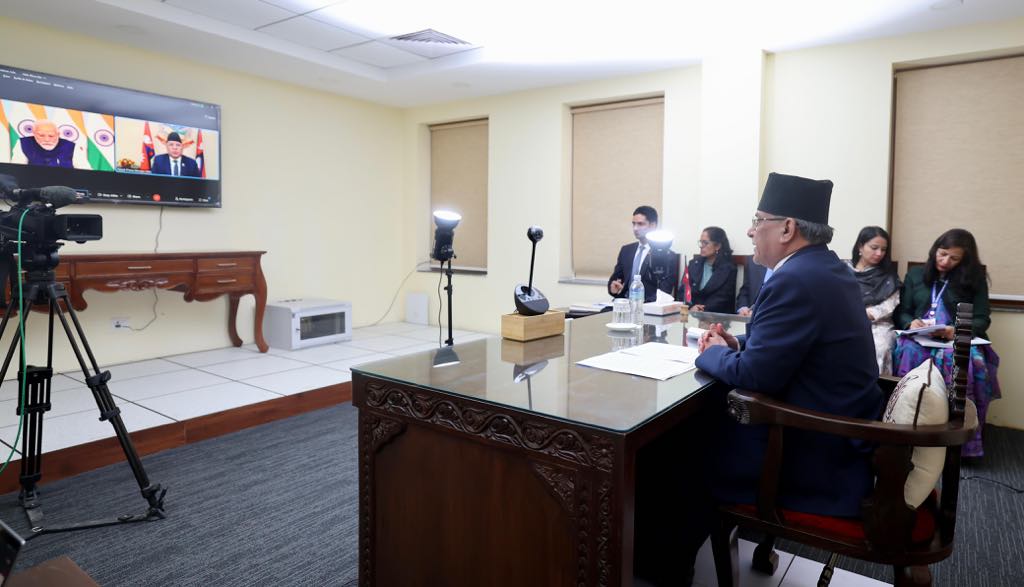
The Prime Minister viewed about the need of
timely reform in the existing global governance architecture for making it
relevant and reflective of today’s realities. “At the same time, reform of the
international financial architecture should be a top priority with full
consideration to the voice of the countries in special situation, including
LDCs, LLDCs and SIDS.”
Full text of PM Prachanda’s remarks:
Remarks by the Rt.
Hon’ble Pushpa Kamal Dahal ‘Prachanda’, Prime Minister of Nepal, at the 2nd
Voice of Global South Summit (VOGSS 2.0)
17 November 2023
Theme: “Global South: Together for One Future”
Your Excellency Shri Narendra Modi ji, Prime Minister of India
Excellencies,
At the outset, I would like to extend my sincere
thanks to the Prime Minister of India His Excellency Shri Narendra Modiji for
inviting me to join this important 2nd Summit on Voice of Global
South.
The theme of this Leaders’ Session of the Summit
“Global South: Together for One Future” is timely and relevant in the present
context especially as we grapple with a multitude of challenges in a world
beset with turbulence.
We appreciate the successful organization by the Government
of India of the first Voice of the Global South Summit earlier this year which recognized
that growth and development must focus on the most vulnerable. It further helped
place the concerns of developing countries on the G20 agenda.
I also take this opportunity to congratulate India
on its successful G20 Presidency under which substantial achievements were made
by the group.
Excellencies,
We are facing unprecedented crises generated by the
COVID-19 pandemic, climate change, and deepening geo-political complexities. They
have impacts on food and nutrition, health and education, economy and
environment, and peace and security.
The developing countries especially the LDCs are the
most affected ones by these crises. Rising food and energy prices, tightening
financial conditions, and persistent cycles of vulnerabilities continue to add
to their worries.
Many countries of the Global South are under
unsustainable debt burden which is straining investments in health, education,
social justice, and other pressing national priorities.
We believe that in order to address the challenges
facing the world, the international community must focus on common goals of
peace, progress and prosperity. For this, building of trust, promoting
partnership and collaboration and working in solidarity remain crucial.
We need to champion inclusive and sustainable
global growth, in which the Global South receives a fair share to eradicate
poverty and give their people a decent life.
Nepal remains steadfast in its commitment to
multilateralism, with the United Nations at the centre. Nonetheless, we believe
that the existing global governance architecture needs a timely reform for
making it relevant and reflective of today’s realities. At the same time,
reform of the international financial architecture should be a top priority
with full consideration to the voice of the countries in special situation,
including LDCs, LLDCs and SIDS.
Climate change remains a grave threat to humanity.
Climate vulnerable countries like Nepal have been bearing the burden of climate
change. The effect of climate change on the Himalayas has posed severe threat
to the lives and livelihoods of millions of people living in our region. We all
must commit ourselves to achieving the set ambitions in a time-bound manner.
With full commitment to the effective
implementation of the Paris Agreement, Nepal has set a target of reaching a
net-zero emission by 2045 through, among other things, conserving and
sustainably managing natural resources, undertaking effective adaption and
mitigation measures, and promoting a green, resilient and inclusive economy.
In this context, we believe that easy access to
climate finance is prerequisite to a low-carbon and climate resilient
development.
Excellencies,
Talking about our national priorities, I feel happy
to share that Nepal is graduating from the LDC status by 2026 and we are
committed to making this process smooth, sustainable and irreversible.
Sustainable Development Goals remain at the centre
of our development vision and priorities with integration into national
policies and plans. But even the progress that we achieved so far has been
threatened by the multitude of global crises.
Hence, we have been calling for an enhanced level
of international support from our partners such as development assistance, FDI,
trade facilitation, technology transfer and technical assistance. The
South-South cooperation should also be forthcoming to lifting the most needy
countries.
Excellencies,
To conclude, while expressing our
sincere commitment to work closely with the international community for
advancing the cause of developing countries, I wish this Summit every success
in sketching
a path ahead for meaningful cooperation and coordination in order to help shape
a participatory ‘One Future’.
Thank you!

